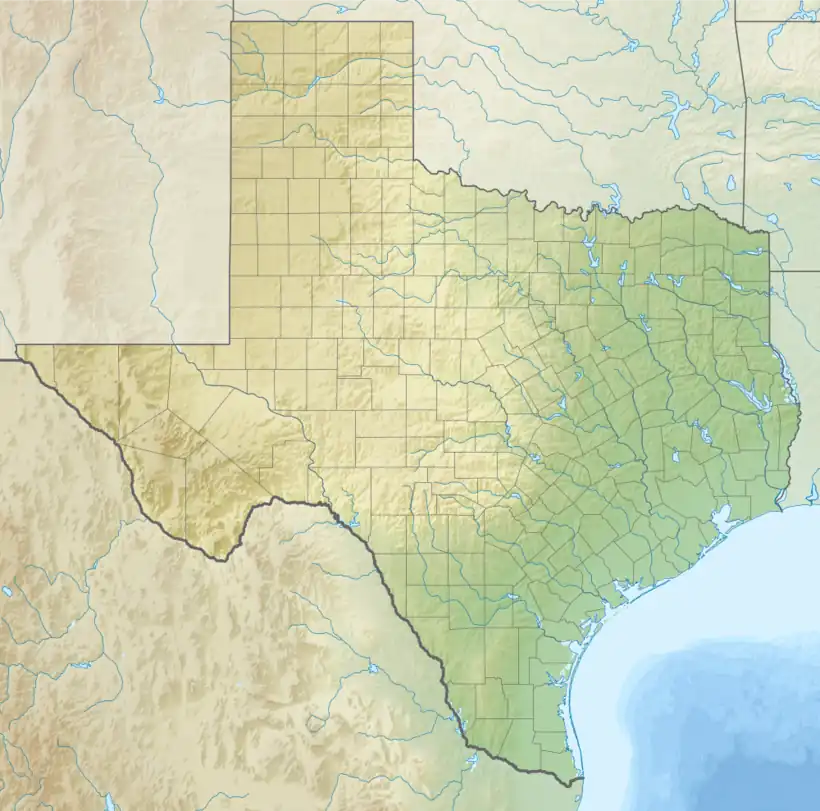Tesnus, Texas | |
|---|---|
 Tesnus, Texas Location within Texas | |
| Coordinates: 30°7′5″N 102°53′52″W / 30.11806°N 102.89778°W | |
| Country | United States |
| State | Texas |
| County | Brewster |
| Elevation | 3,720 ft (1,134 m) |
| Time zone | UTC-6 (Central (CST)) |
| • Summer (DST) | UTC-5 (CDT) |
| ZIP codes | 79843 |
| Area code | 432 |
| GNIS feature ID | 1379153 |
Tesnus is a ghost town and unincorporated community in Brewster County, in the U.S. state of Texas.
History
Tesnus was laid out in 1882 when the Southern Pacific Railroad was extended to that point.[1] Tesnus (sunset spelled backwards) was so named for the fact a sunset appeared in the logo of the Southern Pacific Railroad.[2] A post office was established at Tesnus in 1912, and remained in operation until 1954.[3]
Geology
Tesnus, Texas, is the namesake for the geological formation known either as the Tesnus Formation or Tesnus Shale. Bedrock outcrops around Tesnus, Texas serve as the type locality for the Tesnus Formation.[4]
The Upper Mississippian – Lower Pennsylvanian Tesnus Formation is a significant, wide-spread formation that is composed primarily of interbedded olive-drab to black shale, siltstone, and fine- to very fine-grained sandstone. It thins from 2,000 meters (6,600 ft) in the eastern Marathon Uplift westward to 100 meters (330 ft). The base of the Tesnus Formation in the eastern Marathon Uplift consists of a 100 meters (330 ft) thick shale blanket that makes up the entire thickness of this formation in the west. The sandstone layers are as much as 5 meters (16 ft)thick, but most layers are between 30 and 150 cm (12 and 59 in). Locally, its shales contain carbonaceous plant fragments and spores and some of its sandstone beds contain wood casts up to 30 cm (12 in) long. Rare fossils of conodonts, radiolaria, sponge spicules, a crustacean, and inarticulate brachiopods have also been found in the Tesnus Formation.[5]
The sediments comprising the Tesnus Formation accumulated within deep sea submarine fan and channel complexes. These sediments came dominantly from the southeast, likely from an approaching continental terrane that later collided with North America during the Ouachita orogeny. The Tesnus Formation and associated strata were folded into a northeast trending fold belt and thrust faulted northwestward by the Ouachita orogeny, which also formed the Ouachita Mountains of Arkansas and Oklahoma.[5][6][7]
See also
References
- ↑ Tesnus, TX from the Handbook of Texas Online
- ↑ U.S. Geological Survey Geographic Names Information System: Tesnus, Texas
- ↑ "Brewster County". Jim Forte Postal History. Retrieved August 18, 2015.
- ↑ Baker, C.L. and Bowman, W.F., 1917. Geologic exploration of the southeastern front range of Trans-Pecos Texas. University of Texas Bulletin. 1753, 117 pp.
- 1 2 McBride, E. F., 1989, Stratigraphy and sedimentary history of pre-Permian Paleozoic rocks of the Marathon uplift, in R. D. Hatcher, Jr., W. A. Thomas, and G. W. Viele, eds., The Appalachian-Ouachita orogene in the United States: the geology of North America: Boulder, Colorado, Geological Society of America, v. F-2, pp.603–620.
- ↑ McBride, E.F. and Hayward, O.T., 1988. Geology of the Marathon uplift, west Texas. Geological Society of America Centennial Field Guide, 4, pp.411-416.
- ↑ Hickman, R.G., Varga, R.J., and Altany, R.M., 2009, Structural style of the Marathon thrust belt, West Texas. Journal of Structural Geology, v. 31, no. 9, pp.900–909.
